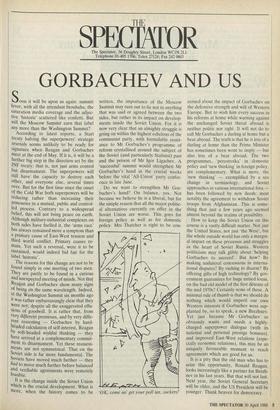SPECT THE AT OR The Spectator, 56 Doughty Street, London WC1N 2LI.
Telephone 01-405 1706; Telex 27124; Fax 242 0603
GORBACHEV AND US
Oon it will be upon us again: summit fever, with all the attendant brouhaha, the saturation media coverage and the adjec- tive 'historic' scattered 'like confetti. But will the Moscow Suminit earn that label any more than the Washington Summit?
According to latest reports, a Start treaty halving the superpowers' strategic arsenals seems Unlikely to' be ready for Signature when Reagan and Gorbachev meet at the end of May. If it is, it will be a further big step in the direction set by the INF treaty: that is, not just arms control but disarmament. The superpowers will still have the capacity to destroy each Other, and everyone else, several times over. But for the first time since the onset Of the edio War both superpowers will be reducing father than ' increasing their armouries in a mutual, public and control- led process. Contrary ' to a widespread belief, this will not bring peace on earth. Although military-industrial complexes on both sides have fuelled it, the 'arms race' .has always remained more a symptom than a primary cause of East-West tension and third world conflict. Primary causes re- main. Yet such a reversal, were it to be sustained, would indeed bid fair for the label 'historic'.
The reasons for this change are not to be found simply in one meeting of two men. They are partly to be found in a curious and unexpected meeting of minds. Not that Reagan and Gorbachev show many signs of being on the same wavelength. Indeed, at the Washington Summit six months ago it was rather embarrassingly clear that they Were not; despite all the exaggerated effu- sions of goodwill. It is rather that, from very different premisses, and by very diffe- rent reasoning — Gorbachev by hard- headed calculation of self-interest, Reagan by soft-headed wishful thinking — they have arrived at a complementary commit- Mein tO disarmament. Yet these reassess- ments are not symmetrical. That on the Soviet side .is far 'more fundamental. The Soviets have moved much further — they had to move much further before balanced and verifiable agreements were remotely feasible: .
It is the change inside the Soviet Union Which is the crucial development. What is more, when the history comes to be
written, the importance of the Moscow Summit may turn out to lie not in anything that was said or agreed between the two sides, but rather in its impact on develop- ments inside the Soviet Union. For it is now very clear that an almighty struggle is going on within the highest echelons of the communist party, with formidable resist- ance to Mr Gorbachev's programme of reform crystallised around the subject of the Soviet (and particularly Stalinist) past and the person of Mr Igor Ligachev. A 'successful' summit would strengthen Mr Gorbachev's hand in the crucial weeks before the vital 'All-Union' party confer- ence in late June.
Do we want to strengthen Mr Gor- bachev's hand? On balance, yes. Not because we believe he is a liberal, but for the simple reason that all the major politic- al alternatives currently on offer in the Soviet Union are worse. This goes for foreign policy as well as for domestic policy. Mrs Thatcher is right to be con-
'OK, come an' get your poll tax, suckers.'
cerned about the impact of Gorbachev on the defensive strength and will of Western Europe. But to wish him every success in his reforms at home while warning against the unchanged Soviet threat abroad is neither politic nor right. It will not do to call Mr Gorbachev a darling at home but a bear abroad. The truth is that he is less of a darling at home than the Prime Minister has sometimes been wont to imply — but also less of a bear abroad. The two programmes, 'perestroika' in domestic policy and 'new thinking' in foreign policy, are complementary. What is more, the 'new thinking' — exemplified by a sea change in terminology, and Soviet approaches in various international fora — has been followed by new deeds: most notably the agreement to withdraw Soviet troops from Afghanistan. This is some- thing that just a few years ago seemed almost beyond the realms of possibility.
How to keep the Soviet Union on this course is a vastly difficult matter. Not just the United States, not just 'the West', but the whole outside world has only a margin- al impact on these processes and struggles in the heart of Soviet Russia. Western politicians may talk glibly about 'helping Gorbachev to succeed'. But how? By making unilateral concessions in interna- tional disputes? By rushing to disarm? By offering gifts of high technology? By gov- ernment guarantees for huge untied loans, on the bad old model of the first détente of the mid 1970s? Certainly none of these. A minimal rule of thumb is that we should do nothing which would imperil our own Western interests if Gorbachev were sup- planted by, so to speak, a new Brezhnev. Yet just because Mr Gorbachev so obviously wants and needs a highly- charged superpower dialogue (with its national and personal prestige bonuses), and improved East-West relations (espe- cially economic relations), this may be an uniquely favourable moment to reach agreements which are good for us.
It is a pity that the old man who has to seize this opportunity, Ronald Reagan, looks increasingly like a partner for Brezh- nev in his last years. But that will not last. Next year, the Soviet General Secretary will be older, and the US President will be younger. Thank heaven for democracy.


























































 Previous page
Previous page